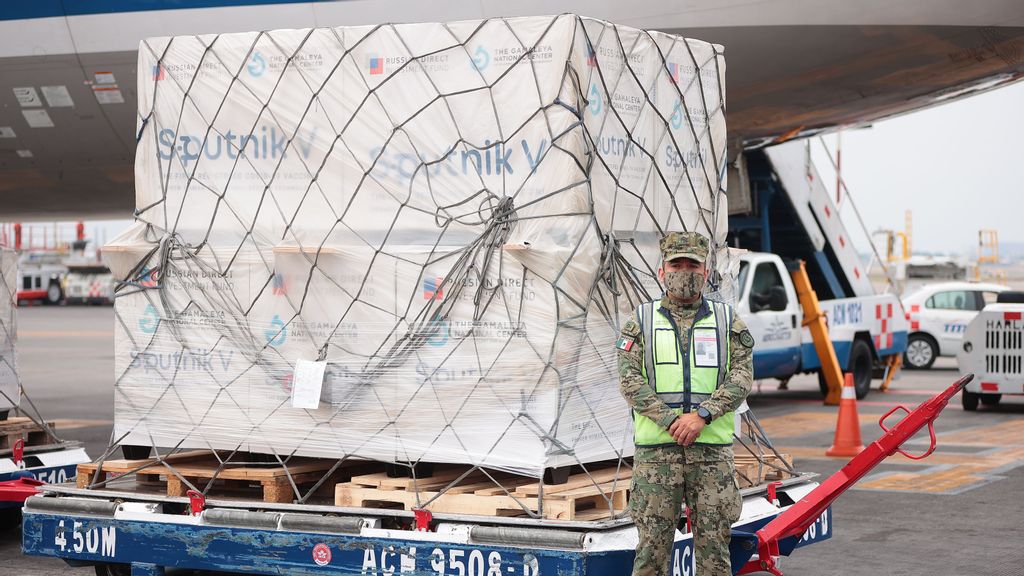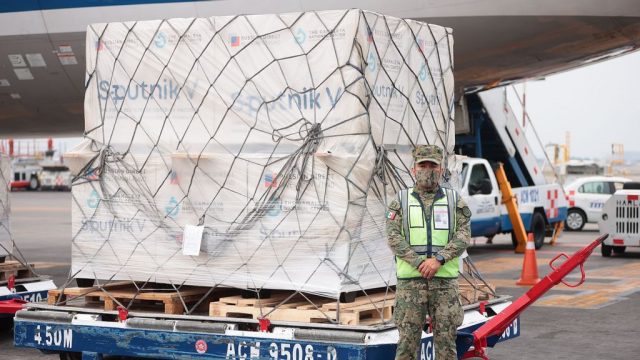
CARACAS, Venezuela — Russia was the first country to announce a COVID-19 vaccine in mid-August 2020. More than a year later, while Russia receives requests to export more than 600 million doses, the Sputnik V vaccine still awaits approval from global health agencies.
Russia has been one of the primary vaccine suppliers in Latin America, where many countries have difficult access to other vaccines.
Argentina, Bolivia, Mexico, Nicaragua, Paraguay and Venezuela are among the countries utilizing Sputnik V the most.
The European Medicines Agency announced it would not complete the Sputnik V testing before 2022, claiming the manufacturer has not sent the required data. The World Health Organization is still testing the Russian vaccine and may approve it soon.
The U.S. Food and Drug Administration has not approved the Sputnik V vaccine — even for emergency use.
After more than a year of closing its land ports of entry to foreign nationals, the United States reopened them on Nov. 8. But it announced that travelers who want to enter the country must comply with the new health protocols. The announcement set off alarms for thousands of Latin Americans.
The U.S. used to be one of the main destinations for vaccine tourism. But now, travelers will not be able to enter the country if they have not received one of the vaccines approved by the Food and Drug Administration or the World Health Organization: Pfizer-BioNtech, AstraZeneca, Janssen, Moderna, Sinopharm and Sinovac.
Yet, the Sputnik V is among the four most effective vaccines against COVID-19, according to official data. Its efficacy rate (91.6%) is higher than vaccines developed by Sinopharm, Oxford-AstraZeneca and Janssen.
“We feel discriminated against. We trusted the [Sputnik V] vaccine because we had no other choice, and we thought we were doing things right,” Federico López, an Argentine factory worker, told Zenger.
“Unfortunately, we had very few options because [the Buenos Aires Province] only offered the Russian vaccine. The process was hard because it seemed that my family’s turn would never come. … We were very careful and still caught COVID-19. We had a hard time, but managed to recover. Soon after, it was our turn to get the vaccine,” said López.
During the pandemic, López bought tickets to fly to Miami, Florida, on Dec. 3, hoping to reunite with his family, after not seeing them for two years.
“Now, there are more vaccine options, but we already have the two Sputnik V shots, and people don’t want or can’t give us a vaccine approved by the World Health Organization or the U.S. Food and Drug Administration,” said López.
Así se prepara el primer cargamento de Sputnik V en Moscú para venir a nuestro país. #AerolineaDeBandera pic.twitter.com/TwoRUBCfVr
— Aerolíneas Argentinas (@Aerolineas_AR) December 23, 2020
Argentina was the first country in Latin America to apply the Sputnik V vaccine. Government planes brought the first shipments from Moscow in December 2020. Millions of Argentines now are fully vaccinated, but cannot travel to certain countries.
The government brought to Buenos Aires “the Sputnik V with much controversy. Our regulatory body, the National Administration of Drugs, Food and Medical Technology, approved it for emergency use in Argentina. … I got vaccinated because we were told that the best vaccine is the one you can get. The World Health Organization said all vaccines were effective, and people should get vaccinated with what was available. I believed it. And now there’s this little issue: the [Sputnik V] vaccine is still not approved,” Agustina Wallbrecher, an Argentine translator, told Zenger.
“AstraZeneca and Sinopharm were available at the same time, but you couldn’t choose what vaccine to get. You got what was at hand and, if you did not want it, you just didn’t get vaccinated. I wanted to take care of myself and the people around me. That was what science [people] told you to do,” Wallbrecher said.
“We have a trip that we paid for in 2019. It is a family trip where grandmothers and children will be traveling. We have rescheduled it four times and finally set a date for early 2022. We believed things were improving. Having been vaccinated, [we thought] nothing could go wrong. Suddenly, there is this restriction,” she said.
“We are about to lose our life savings just because we were vaccinated, because we did things the right way, even though it seems crazy. We feel discriminated against; we are desperate. I can’t sleep thinking about it. I cry. I’ve lost my appetite, and my health is failing. I don’t know what is behind this, and it is not fair. … Ordinary people are the ones who will be affected,” Wallbrecher said.
The United States is not the only country closing its borders to people vaccinated with Sputnik V.
“I was stranded in Venezuela since March of last year because the Spanish government wouldn’t let me into the country with the Russian vaccine,” Ariana Hernández, a Venezuelan student, told Zenger.
“At first, it didn’t affect me much because I could connect to online classes, but as in-person education resumed, I started falling behind in my studies and jeopardizing my scholarship,” she said. “Mexicans and Argentines who have the Russian vaccine can enter Europe. Why can’t Venezuelans?”
Llegué al mismo tiempo que el
Dr. Tedros Adhanom Ghebreyesus, Director de la Organizacion Mundial de la Salud. Le felicité por su labor en la pandemia y le compartí porqué es tan relevante acelerar el reconocimiento de vacunas como Sputnik o Cansino. Fue muy receptivo y amable. pic.twitter.com/Y6ESokK0z5— Marcelo Ebrard C. (@m_ebrard) October 30, 2021
The Mexican government is requesting the World Health Organization approve the Sputnik V and CanSino vaccines. The latter is the Chinese vaccine that many Mexicans received.
The World Health Organization delayed its approval when researchers found the Sputnik V vaccine did not comply with manufacturing standards. The Russian government recognized the flaws and corrected them, but the estimated approval date is still unknown.
While the Mexican government has pushed for approval, the Sputnik V manufacturers accused then-U.S. President Donald Trump’s administration on Twitter of pressuring Jair Bolsonaro’s government in Brazil to reject the Russian vaccine.
US Dep. of Health publicly confirmed that it pressured Brazil against Sputnik V.
We believe countries should work together to save lives. Efforts to undermine the vaccines are unethical and are costing lives.
https://t.co/Ga5i4zvbCt P.48 pic.twitter.com/A6wyKOkc8t
— Sputnik V (@sputnikvaccine) March 15, 2021
“We believe countries should work together to save lives. Efforts to undermine the vaccines are unethical and are costing lives,” reads the post.
Translated by Gabriela Alejandra Olmos; edited by Melanie Slone and Fern Siegel
The post Vaccine Discrimination? Latin Americans Immunized With Sputnik V Have Limited Travel Options appeared first on Zenger News.




